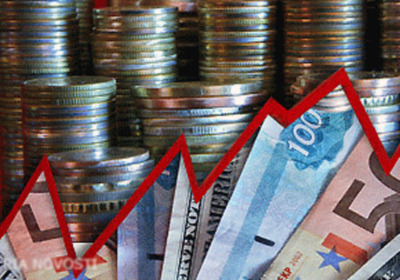Bank of America Seeing Life Signs in Russia’s Foundering Economy

(Bloomberg – bloomberg.com – Elena Popina – September 27, 2015)
[Chart here bloomberg.com/news/articles/2015-09-27/bank-of-america-seeing-life-signs-in-russia-s-foundering-economy]
Bank of America Corp. is starting to see faint signs of an economic recovery in Russia.
The magnitude of a slowdown in capital investment is easing, while corporate profits have been increasing, a combination that Vladimir Osakovskiy, the bank’s chief economist in Moscow, said could mark a turning point. The country’s recession may have bottomed when gross domestic product shrank 4.6 percent in the second quarter, and considering that company spending will probably drive the recovery, that stabilization is likely to be more important for the broader economy than persistent weakness in consumer demand, he wrote in a report last week.
“Corporate profits in Russia are quite good year-to-date, and we look at robust growth in corporate profits as the main potential driver of stabilization and recovery in the near future,” Osakovskiy said by phone from Moscow last week. “We might see that the main macroeconomic indicators will start to improve on a year-over-year basis later this year, but we obviously have to wait until the increase in corporate profits spills over to the pickup in investment.”
Corporate profits increased 43 percent in the first half of 2015 compared with a year earlier and grew 38 percent from January to July, even as oil plunged further into a bear market, data from the Federal Statistics Service show. That means companies might soon look to use capital to focus on expansion, Osakovskiy said. Investment is the only way to stimulate growth in Russia’s economy, Deputy Finance Minister Maxim Oreshkin said this month.
Bank of America remains neutral on Russian markets, while the price of oil, the country’s biggest export, remains volatile, according to Osakovskiy. The country’s stocks remains a risky buy in the near future, but their low valuations compared with equities in other emerging markets make Russia an attractive investment destination in the medium term, he said.
Capital Flight
Russia’s Micex index trades at 5.2 times projected earnings, the cheapest among emerging-market peers, according to data compiled by Bloomberg. The dollar-denominated RTS Index, which has historically been highly correlated with the price of oil, can rally to 930 in the next 12 months, an 18 percent increase from Friday’s closing level, BCS Financial Group said.
Investors, who had been returning to Russia earlier this year following the world’s biggest stock slump in 2014, have been backpedaling since May as the ruble resumed its retreat and swelling global inventories pushed Brent crude to less than half its five-year average price. Franklin Templeton, which oversees almost $900 billion of assets, liquidated its 20-year-old regional fund. French lender BNP Paribas SA exited its local fund-management venture six years after its acquisition.
Alfa Capital, Barclays
Andrey Shenk, an analyst at Alfa Capital in Moscow, said a turnaround in crude prices and signs that the worst of the economic slump is over could be all it takes to lure investors back again.
“Russia doesn’t look like a rosy investment destination amid a recession and plunging oil, but the market is cheap and valuations can be attractive,” Shenk said by phone. “Once we see oil going back up and the economy improving, Russia could be a good place for investors to consider.”
Daniel Hewitt, an economist at Barclays Plc in London who forecasts Russia’s economy to contract 4 percent in 2015 and 0.7 next year, doesn’t see that happening any time soon.
“The economy declined about 5 percent in the second quarter and probably won’t get much worse, but the main thing is that it’s not going to get better,” Hewitt said by phone. “It looks like bad times are here to stay.”
Stock Slump
The Bloomberg Russia-US Equity Index slumped 4.2 percent in New York last week. The Market Vectors Russia ETF retreated 2.7 percent to $15.64. The ruble strengthened 1.7 percent against the dollar, posting the only weekly gain among 24 emerging-market currencies tracked by Bloomberg.
Brent crude, which has slumped from a peak of $115 a barrel in June 2014, sold for $48.60 at the close of trading Friday. Taking into account the ruble’s 47 percent depreciation during the same period, the negative impact of lower oil prices on Russia’s economy is mitigated, according to Renaissance Capital’s Daniel Salter. When factoring in the currency plunge, the current oil price would be the equivalent of about $91, he said.
“We see no continued contraction in growth even with oil price averaging $50 per barrel,” Salter said in a report last week.
Article ©2015 Bloomberg L.P. All Rights Reserved. Article also appeared at bloomberg.com/news/articles/2015-09-27/bank-of-america-seeing-life-signs-in-russia-s-foundering-economy
